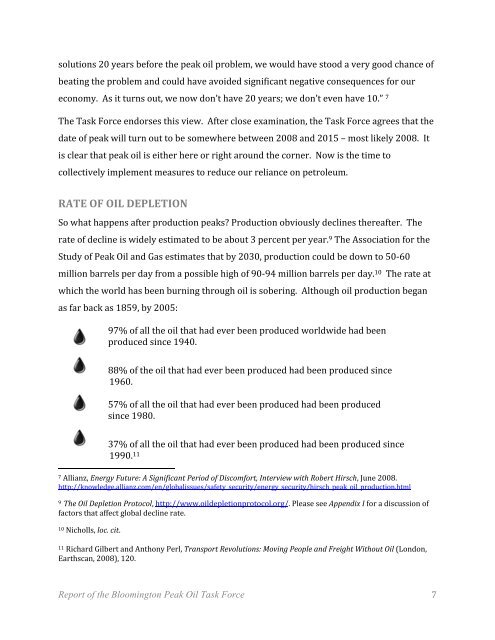- Page 2 and 3: Redefining Prosperity: Energy Desce
- Page 4 and 5: This report is dedicated to Colin J
- Page 6 and 7: Preface Our society is reaching a t
- Page 8 and 9: EXECUTIVE SUMMARY Oil infuses just
- Page 10 and 11: Transportation. Of all sectors, tra
- Page 12 and 13: Report of the Bloomington Peak Oil
- Page 14 and 15: The “Hubbert Curve.” Decades ag
- Page 16 and 17: Other observers believe that peak o
- Page 20 and 21: What’s more, it is highly unlikel
- Page 22 and 23: Biofuels Some believe that it will
- Page 24 and 25: THE BLOOMINGTON PEAK OIL TASK FORCE
- Page 26 and 27: ENDORSEMENT OF THE OIL DEPLETION PR
- Page 28 and 29: NEXT STEPS This Report outlines a n
- Page 30 and 31: THE ECONOMIC CONTEXT The enormous e
- Page 32 and 33: Inflation and Volatility It will be
- Page 34 and 35: Daily changes in the spot price of
- Page 36 and 37: Daly writes: That was when I realiz
- Page 38 and 39: instead of the old notion that “b
- Page 40 and 41: Fuel Rationing As we collectively s
- Page 42 and 43: MITIGATION GOALS & STRATEGIES Follo
- Page 44 and 45: • Local government should collabo
- Page 46 and 47: transit and pedestrian and biking f
- Page 48 and 49: On the other hand, there is probabl
- Page 50 and 51: • all City traffic signals have b
- Page 52 and 53: THIRSTY WATER: THE WATER SUPPLY Sin
- Page 54 and 55: Water Treatment Treatment of water
- Page 56 and 57: MITIGATION GOALS & STRATEGIES A com
- Page 58 and 59: 2. Advocate a tiered pricing system
- Page 60 and 61: 4. Offer other efficiency incentive
- Page 62 and 63: MEDIUMTERM (5‐15 years) 1. Expl
- Page 64 and 65: WASTE DISPOSAL: THE DETRITUS OF CON
- Page 66 and 67: 89,582 tons of garbage in 2007. 84
- Page 68 and 69:
MITIGATION GOALS & STRATEGIES SHORT
- Page 70 and 71:
MEDIUMTERM STRATEGIES (515 year
- Page 72 and 73:
Re‐establishing a local landfill
- Page 74 and 75:
2. Transition all backup generato
- Page 76 and 77:
POLICE, FIRE & OTHER EMERGENCY SERV
- Page 78 and 79:
3. There is a potential for increas
- Page 80 and 81:
MEDIUMTERM (515 years) 1. The P
- Page 82 and 83:
OTHER EMERGENCY SERVICES Non‐rout
- Page 84 and 85:
FLEET & STREET: CARBON WEBS & ASPHA
- Page 86 and 87:
In an effort to save money, reduce
- Page 88 and 89:
MITIGATION GOALS & STRATEGIES SHORT
- Page 90 and 91:
esidents who work from home, howeve
- Page 92 and 93:
MAINTAINING CITY STREETS Everything
- Page 94 and 95:
MEDIUM TERM (515 Years) 1. Reduce
- Page 96 and 97:
As summarized by Pat Murphy in Plan
- Page 98 and 99:
MITIGATION GOALS & STRATEGIES SHORT
- Page 100 and 101:
Report of the Bloomington Peak Oil
- Page 102 and 103:
just to cover the cost of vehicle m
- Page 104 and 105:
REVIEW OF THE CURRENT SITUATION: PA
- Page 106 and 107:
Report of the Bloomington Peak Oil
- Page 108 and 109:
About the Activity Nodes Project In
- Page 110 and 111:
MAP B: Population Density Report of
- Page 112 and 113:
Natural Neighborhoods One key step
- Page 114 and 115:
VULNERABILITIES 1. When it comes to
- Page 116 and 117:
3. Include plans for peak oil in th
- Page 118 and 119:
MEDIUMTERM (515 years) 1. Trans
- Page 120 and 121:
Both the City of Bloomington and Mo
- Page 122 and 123:
5. Build in physical separation buf
- Page 124 and 125:
Report of the Bloomington Peak Oil
- Page 126 and 127:
REVIEW OF THE CURRENT SITUATION: VM
- Page 128 and 129:
Oil & Equity: The Impact of Fuel Co
- Page 130 and 131:
Fuel as Percentage of Income 100.00
- Page 132 and 133:
The Distance Factor The greater the
- Page 134 and 135:
Pedestrian Friendliness Just how
- Page 136 and 137:
MAP E: WalkScore Analysis of 55 Nat
- Page 138 and 139:
THE CURRENT SITUATION: PUBLIC TRANS
- Page 140 and 141:
Hoosier Bus Hoosier Bus is Indiana
- Page 142 and 143:
BT owns 42 conventional diesel buse
- Page 144 and 145:
MAP F: Walkability of Bloomington T
- Page 146 and 147:
5. Intercity rail is not available.
- Page 148 and 149:
MITIGATION GOALS & STRATEGIES In th
- Page 150 and 151:
2. Develop a community cooperative
- Page 152 and 153:
The City should establish or encour
- Page 154 and 155:
6. Update the LongRange Transport
- Page 156 and 157:
Make bike riding on major arterials
- Page 158 and 159:
11. Seek greater public investment
- Page 160 and 161:
13. Fully unify the BT and campus b
- Page 162 and 163:
15. Establish public or private lon
- Page 164 and 165:
LONGTERM (1530 years) 1. Shrink
- Page 166 and 167:
REVIEW OF THE CURRENT SITUATION Hou
- Page 168 and 169:
Number of People per Square Foot Wh
- Page 170 and 171:
Local Incentives The community has
- Page 172 and 173:
VULNERABILITIES 1. Potential for po
- Page 174 and 175:
5. Restrictive covenants on use of
- Page 176 and 177:
2. The community should explore the
- Page 178 and 179:
Granny flats In Bloomington, there
- Page 180 and 181:
7. Actively work to grow building e
- Page 182 and 183:
10. Educate and motivate citizens t
- Page 184 and 185:
SUSTENANCE: FOOD, WATER, WASTE & HE
- Page 186 and 187:
Indeed, it is estimated that the U.
- Page 188 and 189:
Local Food Production Efforts to pr
- Page 190 and 191:
The Current U.S. Diet Americans eat
- Page 192 and 193:
Regional Land and Population The pr
- Page 194 and 195:
Can Bloomington Feed Itself? Feedin
- Page 196 and 197:
population maintained health, while
- Page 198 and 199:
fertility inputs and yields of surp
- Page 200 and 201:
MITIGATION GOALS & STRATEGIES: PLAN
- Page 202 and 203:
SHORTTERM STRATEGIES (15 Years)
- Page 204 and 205:
10. Train and deploy 300 new urban
- Page 206 and 207:
12. The City and other stakeholders
- Page 208 and 209:
23. Reserve open land for agricultu
- Page 210 and 211:
11. Establish a credible local fina
- Page 212 and 213:
Households can contribute significa
- Page 214 and 215:
4. Collect rainwater In addition to
- Page 216 and 217:
and paper. Sources include househol
- Page 218 and 219:
HEALTH CARE The implications of pea
- Page 220 and 221:
MITIGATION GOALS & STRATEGIES: RE
- Page 222 and 223:
The Fourth Layer: Professional Care
- Page 224 and 225:
Opportunities for Citizen Action: W
- Page 226 and 227:
• Use power strips for your home
- Page 228 and 229:
State and utility residential renew
- Page 230 and 231:
CONCLUSION The peaking of productio
- Page 232 and 233:
GILBERT, Richard, and Anthony Perl.
- Page 234 and 235:
PIMENTEL, David, ed. Biofuels, Sola
- Page 236 and 237:
ENERGY WATCH GROUP. “Coal: Resour
- Page 238 and 239:
APPENDICES
- Page 240 and 241:
argued by Brown to dramatically dec
- Page 242 and 243:
In general, the trend has been for
- Page 244 and 245:
Unfortunately, stated coal R/P rati
- Page 246 and 247:
during World War I, then falling as
- Page 248 and 249:
Although the prevailing sense among
- Page 250 and 251:
The following projection of future
- Page 252 and 253:
asserted, “Consequently, our pres
- Page 254 and 255:
The following graph from the Associ
- Page 256 and 257:
APPENDIX IV Vehicle Ownership per P
- Page 258:
Stephanie Kimball is a former Profe









